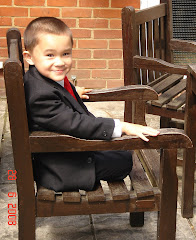I want bath!
Alex is getting more and more verbal each day and this morning, he surprised us with "I want bath".
Jeremy and I were both in bed when he said that. We both heard exactly the same thing and it was very clear. We then asked him to repeat and all he could say after that was gibberish.
I suspect Alex has Apraxia of Speech. I did a search on Google and found the following which support my suspicion. However, I cannot be certain until Alex start to talk for a period of time and has seen a Speech and Language Pathologist.
What is Apraxia of Speech
Apraxia of speech, also known as verbal apraxia or dyspraxia, is a speech disorder in which a person has trouble saying what he or she wants to say correctly and consistently. It is not due to weakness or paralysis of the speech muscles (the muscles of the face, tongue, and lips). The severity of apraxia of speech can range from mild to severe.
Developmental apraxia of speech (DAS) occurs in children and is present from birth. It appears to affect more boys than girls. This speech disorder goes by several other names, including developmental verbal apraxia, developmental verbal dyspraxia, articulatory apraxia, and childhood apraxia of speech. DAS is different from what is known as a developmental delay of speech, in which a child follows the "typical" path of speech development but does so more slowly than normal.
The cause or causes of DAS are not yet known. Some scientists believe that DAS is a disorder related to a child's overall language development. Others believe it is a neurological disorder that affects the brain's ability to send the proper signals to move the muscles involved in speech. However, brain imaging and other studies have not found evidence of specific brain lesions or differences in brain structure in children with DAS. Children with DAS often have family members who have a history of communication disorders or learning disabilities. This observation and recent research findings suggest that genetic factors may play a role in the disorder.
What are the symptoms?
People with either form of apraxia of speech may have a number of different speech characteristics, or symptoms. One of the most notable symptoms is difficulty putting sounds and syllables together in the correct order to form words. Longer or more complex words are usually harder to say than shorter or simpler words. People with apraxia of speech also tend to make inconsistent mistakes when speaking. For example, they may say a difficult word correctly but then have trouble repeating it, or they may be able to say a particular sound one day and have trouble with the same sound the next day. People with apraxia of speech often appear to be groping for the right sound or word, and may try saying a word several times before they say it correctly. Another common characteristic of apraxia of speech is the incorrect use of "prosody" -- that is, the varying rhythms, stresses, and inflections of speech that are used to help express meaning.
Children with developmental apraxia of speech generally can understand language much better than they are able to use language to express themselves. Some children with the disorder may also have other problems. These can include other speech problems, such as dysarthria; language problems such as poor vocabulary, incorrect grammar, and difficulty in clearly organizing spoken information; problems with reading, writing, spelling, or math; coordination or "motor-skill" problems; and chewing and swallowing difficulties.
The severity of both acquired and developmental apraxia of speech varies from person to person. Apraxia can be so mild that a person has trouble with very few speech sounds or only has occasional problems pronouncing words with many syllables. In the most severe cases, a person may not be able to communicate effectively with speech, and may need the help of alternative or additional communication methods.
I hope I am wrong and this is only a temporary phase.
3 De no. 16 .
16 years ago



2 comments:
Hi Christine,
My name is Jennifer, and I have a 3 year old son, Hector (we always call him Munchie), who has Severe Apraixia of Speech, and possible Sensory Processing Dysfunction as well.
We have started teaching him some basic sign language, just enough to make himself understood when he is hungry or thirsty ect. The signs have helped SO much and they are really very simple, I learned most of them that we use at www.babysigns.com I believe is the website...I have it bookmarked! Also www.apraxia-kids.org is an awesome website and has so much info on it not only for the Apraxia but also SPD, and Autism Spectrum, a LOT of the kids whose parents are on the message board and the list serve for apraxia-kids have also been diagnosed in the Autism Spectrum! You might want to go and see what I'm talking about, I love it there...just a suggestion!
Anyway, you have an adorable family!! Good luck! I just wanted to let you know that you are not alone here...I would have a huge party if my son had said "I want bath!" Even just once! Take care and have a great day!
~Jenn;0)
Hi Jennifer,
Thank you for your comment. Really appreciate the websites you suggested. I will take a good look when Alex is at school.
Have a good day and good luck to Hector.
Christine ;-)
Post a Comment